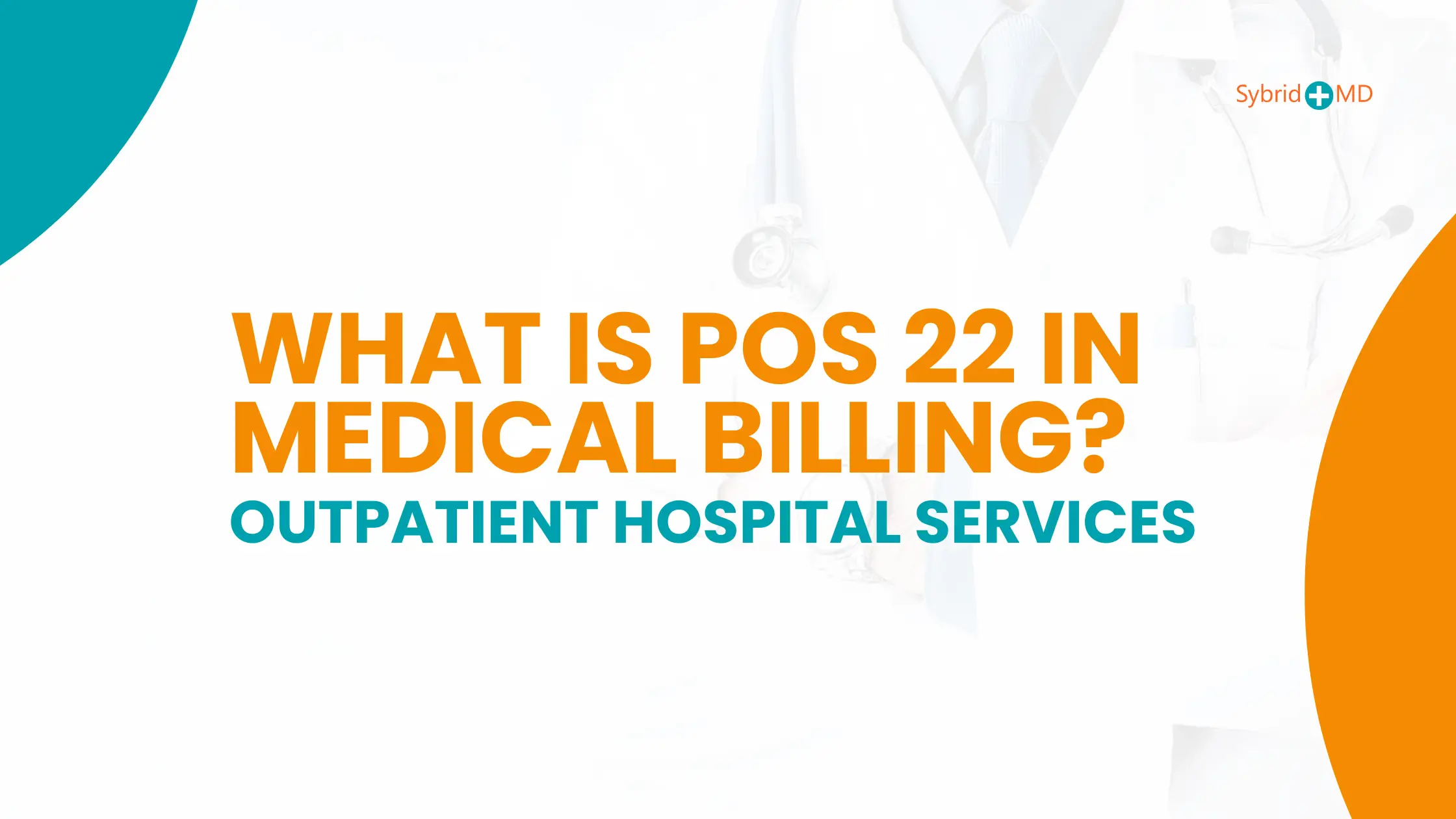POS codes define where a medical service was provided, determining payment for a procedure. This guide discusses POS 22 and its differentiation from offices, the hospital environment, and telehealth.
What is POS 22 in Medical Billing?
POS codes offered in medical billing, POS 22, show that health services were delivered in a hospital outpatient setting. This refers to sections of the health facility where clients are attended to and treated without admitting them to inpatient status. Such services encompass specific diagnostic procedures or other therapeutic and interventional therapies offered on the same day without admission.
POS 22 in medical billing is important because it differentiates outpatient hospital services from those provided by providers related to other places, such as a physician’s office (POS 11) or an ambulatory surgery center (POS 24). Proper use leads to proper billing and contributes to higher reimbursement because of the hospital’s facility cost, staff, and equipment.
Key Features of POS 22:
- Some services are provided inform of outpatients where the client does not have to be admitted to the hospital.
- They usually do not occur suddenly and are all part of a planned regime.
- The services of any prepared medical professionals, other than the physician, are compensated by the health facility differently.
- It is different from POS 11, which is designed exclusively for offices of medical practitioners.
List of POS 22 Billed Services:
- Diagnostic imaging (MRI for high ingest, CT scan for numerous, diverse pathologies and indicated by other tests, radiography for recurrent, chronic, and neoplastic disease)
- Same-day surgical procedures
- Physical and occupational therapy sessions
- Infusion therapy (e.g., chemotherapy)
Comparison Table: POS 22 vs Related Codes
| POS Code | Setting | Admission Required | Common Use Cases | Reimbursement Level |
| POS 22 | Hospital Outpatient Department | No | Imaging, minor surgery, therapy | Medium–High |
| POS 11 | Physician’s Office | No | Routine exams, checkups | Low |
| POS 21 | Hospital Inpatient | Yes | Surgeries, extended recovery | High |
| POS 24 | Ambulatory Surgical Center | No | Cataract removal, colonoscopy | Medium |
That is why it is important to never use the wrong POS, for instance, when billing an outpatient hospital service as a physician’s office visit. POS 22 should be used where the facility is registered as a hospital outpatient department, providers should ensure that the POS 22 document has proper support.
POS in Medical Billing
POS, when it comes to medical billing, is an acronym for Place of Service. It is a two-digit code used on insurance claims to identify the place where the services were rendered. Some of the most frequently used POS codes include POS 11 for specifically a ‘physician’s office,’ POS 22 for ‘hospital outpatient departments,’ and POS 21 for ‘inpatient hospital care.’ These codes aid insurance payers in identifying and establishing the right amount of payment for the particular care setting.
When entering a claim, the correct POS code is very important since it determines the legitimacy of the claim, its compliance, and the amount of payment likely to be paid out. With improper assignment of POS codes, a claim might be denied, delayed, or even lead to an audit. Each setting has its billing parameter and impacts the way services are charged.
POS 11 in Medical Billing
POS 11 refers to services provided in a physician’s office or clinic that is not a hospital-based facility. It is the most frequently applied POS code because many uneventful patient services, including annual physicals, disease maintenance, dermatological procedures, or immunizations of many varieties, are offered on an outpatient basis. That is why reimbursement for POS 11 services is commonly lower than for hospital outpatient services, because the cost structure and overhead of a physician practice are lower. Although hospital-owned clinics may seem independently practicing, they sometimes continue using POS 22, depending on hospital registration and billing entities under Medicare or private insurance.
POS 15 in Medical Billing
POS 15 in medical billing is prescribed in situations where the service of a healthcare provider or veterinarian is rendered in a mobile unit. These are usually, but not exclusively, vehicles or temporary structures used to deliver medical services in areas that are physically distant, inaccessible, or shifting. They are best illustrated by the mobile mammography van, a mobile dental surgery or clan, or a blood pressure check-up van mounted at a festival site. POS 15 is very important for increasing community coverage and is almost always at the forefront during health campaigns. This billing for POS 15 services should be accompanied by a description of the capabilities of the mobile unit and the place of service.
POS 20 in Medical Billing
POS 20 in medical billing applies in services delivered in an urgent care centre which is a centre where one is attended to if they are experiencing a health issue that does not require the emergency room yet cannot wait until the planned appointment with the Dr. Some of the conditions people may present at an urgent care center include flu like, sprains, cuts and scratches, infection, or mild asthmatic attacks.
Such facilities operate for longer periods, including after working hours, and such patients can walk in when they have a problem. POS 20 aids in distinguishing between urgent care visits and a normal office visit (POS 11) as well as emergency department visits (POS 23). It also impacts reimbursement because, unlike the other settings, urgent care centers have somewhat different reimbursement structures and claims procedures.
POS 21 in Medical Billing
POS 21 in medical billing is for services provided to the patient admitted to an inpatient hospital. This code is used when you were formally admitted into a hospital for over a single day at a hospital. Complex surgery, ICU admissions, or any chronic/acute illness admissions or observation fall under POS 21. Since inpatient hospital care takes time, uses as many staff and amenities such as bed and board, and calls for specialized nursing and equipment, most claims with POS 21 will be more expensive.
POS 23 in Medical Billing
POS 23 shows that service delivery took place in the hospital emergency unit. This applies to occasions when a patient requires treatment for an acute or emergent condition and could have a life-threatening issue, such as chest pain, head injury, bone fracture, or uncontrolled hemorrhage. POS 23 refers to the types of services that need rapid response teams, equipment, and triage systems, and services offered under POS 23 are qualified for the premium rate of reimbursement in emergency rooms. When using POS 23, there should be evidence to support that the visit was indeed an emergency and that this code corresponds with an unscheduled, emergent medical need.
POS 24 in Medical Billing
POS 24 pertains to an Ambulatory Surgical Center and/or clinic facility. They are independent centres that are used to provide care outside of a hospital and including minor operations and procedures. Such inclusive procedures are colonoscopies, cataract surgery, and arthroscopy. POS 24 differentiates it from those conducted in a hospital (POS 22) or clinic/office (POS 11), by its cost structure and compliance with regulatory requirements. POS 24 requires facilities to be Medicare-certified and meet certain conditions to be able to bill under the code. Lack of understanding of a given payer’s payment policy, coupled with improper POS, may lead to under- or over-billing.
POS 02 in Medical Billing
POS 02 applies when telehealth services are delivered when a patient is in a place other than their home, including a clinic or school, among others. This is because, generally, POS 02 has gained popularity with the increasing demand for virtual care. It is different from POS 10, which is used where a telehealth service is provided to the patient while the patient is at home. POS 02 assists insurance payers to understand that although the patient was provided remote care, they also may require facility involvement or oversight. These splits of telehealth services make it easier to track and account for each service received rightfully in different care settings.
Conclusion
POS 22 is critically important in medical billing, as it helps document and bill for services that are provided in a hospital outpatient department. It serves to differentiate them from services provided in a physician’s office, emergency treatment, or inpatient care.
POS 22 knowledge and its proper application also eliminates so many payer rules violations while at the same time helping to develop a means to facilitate reimbursement of services that need more use of resources. When used in conjunction with other related codes such as POS 11, 20, or 24, medical billers and healthcare providers can therefore be confident that they increase their chances of optimally processing claims, minimize the rate of claim denial, and ultimately achieve the best possible financial results.
Frequently Asked Questions
Q: What makes POS 22 different from POS 11?
POS 22 is commonly used for outpatient hospital services, which can be more technologically intensive or require standby clinical support, and generally, POS code 22 is usually reimbursed at a higher rate than POS 11, which is used to denote services provided in a physician’s office.
Q: Can I use POS 22 for services via telehealth or telemedicine?
No, telehealth services should be billed using POS 02 (not domiciliary) or POS 10 (domiciliary) only. POS 22 is again specific to inpatient and outpatient hospital care, but for outpatient care only.
Q: What would be the implications of this for me if I use the wrong Positive Observation Statement code?
The utilization of an improper code will result in the denial or delay of payments, audits, or fines. Claims and codes have to be accurate to ensure the correct claim for payment is issued and paid.
Q: Is POS 22 utilized with hospital-owned outpatient clinics?
Yes, it must be present in the hospital outpatient department and be registered. For instance, should a clinic be standalone, similar to a medical practice, POS 11 may suffice.
Q: Is reimbursement higher with POS 22?
Typically, yes. This is mostly because hospital outpatient services always attract a higher payment than office-based services through the application of facility fees as well as resource consumption.

